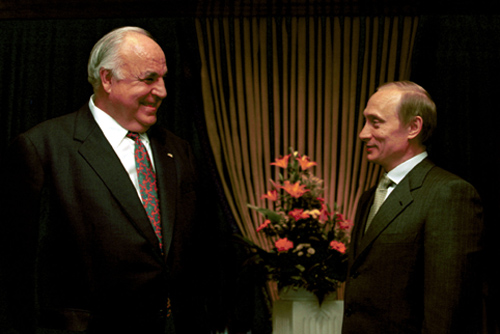From Russia With (More) Love
February 24, 2012 -
Annabelle Chapman
-
Bez kategorii

Vladimir_Putin_with_Helmut_Kohl-1.jpg
Review of BBC’s Putin, Russia & the West
With Russia’s presidential election imminent, a major British documentary reviews the rise of Vladimir Putin. Putin, Russia and the West has excited the public and provoked debate about Russia and how it is represented in the western media.
The documentary, consisting of four hour-long episodes, was screened on BBC2 in the first weeks of 2012. It was produced by award-winning documentary maker Norma Percy, who first worked on Russia in her documentary The Second Russian Revolution (1991), charting the breakup of the USSR. Now, twenty years later, she spent over two years conducting research and filming in Moscow, Washington DC, and various European capitals.
Amid midnight telephone calls, ceremonies and crises, the film constructs a unifying narrative about Putin’s actions at home and abroad. The first episode, Taking Control, shows Putin’s inauguration as President and his first encounters with George W. Bush, before zooming in on his crusade against Russia’s oligarchs. Democracy Threatens, the most visually exciting episode, transports us back to the “Colour Revolutions” in Georgia and Ukraine. It traces Russian and Western mediation between the incumbents and their pro-democratic challengers, and features an extensive interview with a rather disconcerted Leonid Kuchma, who was Ukraine’s President at the time. Episode Three, starkly entitled War, returns to Georgia and the 2008 war there, with its far-reaching international implications. The last episode, New Start, is a comparatively dull look at the improvement of US-Russia relations under President Obama. In anticipation of forthcoming electoral developments, it briefly explores the Putin-Medvedev “tandem”, hinting at the latter’s more modernizing vision for the country.
Archival footage is studded with an enviable collection of interviews with over one hundred politicians, diplomats and advisors. There – for your eyes only – they reveal the secret dynamics behind the headlines of the last decade. Many of them clearly enjoy this complicity with the audience. Georgia’s President, Mikhail Saakashvili, shines through as a buoyant polyglot (notice the large EU flag placed unambiguously behind him). Condoleezza Rice relates how she and the Russian Defense Minister, bored during a grandiose state visit to a Nutcracker performance, crept away together to indulge their shared passion for modern ballet. And yet, these innocent anecdotes seem contrived, as if to distract attention away from the underlying Realpolitik (as journalist Masha Karp points out in her analysis).
“I looked into his eyes, and saw his soul”, said George W. Bush upon first meeting Putin. The film shows how the United States and Russia have tried, with varying success, to build trust after the Cold War, as symbolised by the “reset button” of 2009. The Russia portrayed here remains the West’s “Other”, anti-democratic and imperialist. Yet the film also shows how both states occasionally cooperate in the face of crisis, talking over the heads of the other states in the region, from Georgia to Germany. Meanwhile, in Britain, the so-called “spy rock” affair has caused a stir. In the film’s second episode, a British official indirectly confirmed earlier Kremlin allegations that British agents had been spying in Moscow using a device concealed within a rock. For some observers, this revelation plays directly into Putin’s hands as he is faced with continued protests before the presidential election. And, for the British diplomatic services, it has meant considerable embarrassment.
For all its professionalism, Putin, Russia, and the West has provoked a critical reaction. For some British commentators, it presents Putin exactly as he wants to be seen: as Russia’s saviour. After all, the film advertises itself as “How the great Soviet superpower, crushed and humiliated, has been resurrected in the form of Vladimir Putin's new Russia”. In this vein, former Soviet dissident Vladimir Bukovsky accused it of being “pro-Putinist”. Further doubt about the film’s impartiality has been generated by its hiring Angus Roxburgh, a former PR advisor to the Kremlin, as a consultant. The producers have defended this decision, saying that it helped them penetrate Russia’s otherwise closed political establishment.
Having taken us to the Kremlin and back, Putin, Russia and the West seems to confirm the western public’s suspicions about Russia. For all its menacing soundtrack and sweeping comments (such as “Putin had been KGB, but by now he had turned his back on Communism”), the film’s antihero remains elusive. In any case, the election on 4 March is likely to prolong his story with both Russia and the West.
Annabelle Chapman is a postgraduate student in Russian and East European Studies at Oxford University.


































